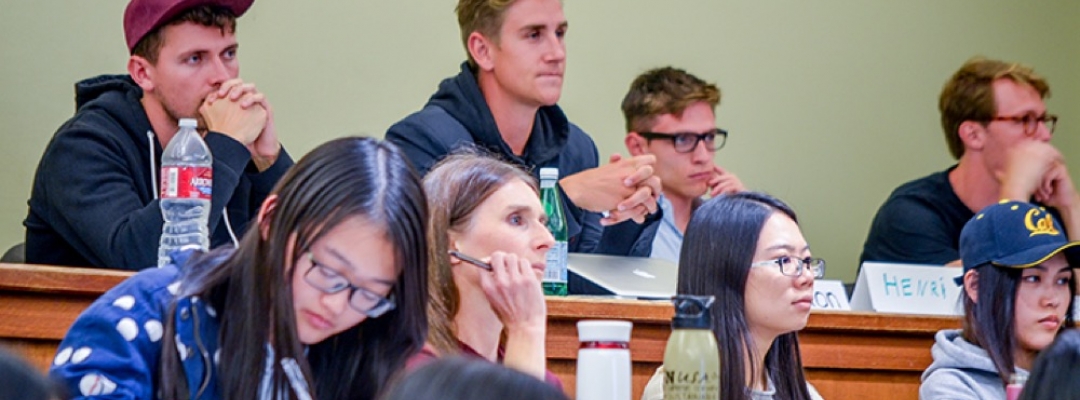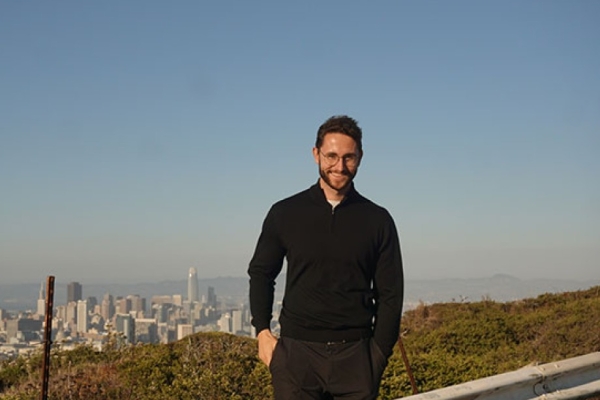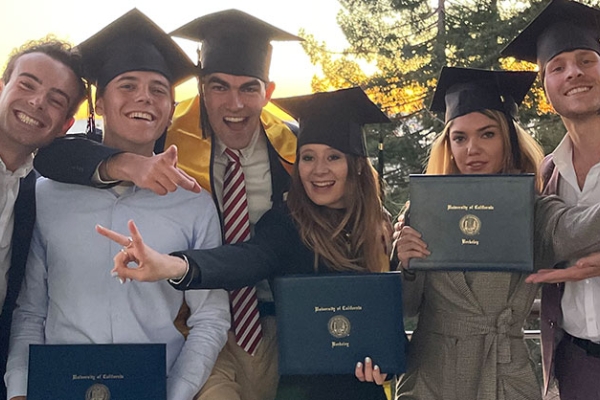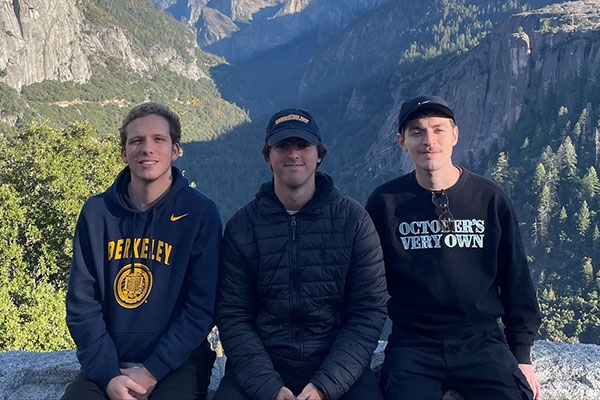Walk into one of Heidi Weller’s Academic and Professional Achievement classes for Berkeley Haas Global Access Program (BHGAP) students, and it’s clear why she was chosen to be involved in the Business School’s newest program. This exciting opportunity brings international students to the diverse Berkeley campus for 1–2 semesters to study business, innovation and entrepreneurship in-depth.
During their semester or academic year at Berkeley, BHGAP students attend a weekly class and receive personalized coaching from Heidi, who focuses on two topics: understanding the factors critical to academic achievement at Haas and exploring how to successfully move from school to career.
She’s built her own impressive résumé, attending UC Berkeley as an undergrad and earning an M.B.A. from Yale. Before becoming an adjunct coach at Berkeley’s Haas School of Business more than 10 years ago, Heidi worked in consulting, spent time as a Trustee for the Ross Valley School Board and co-founded and worked for various early stage stage startups. She’s lived and worked abroad, spending more than a year traveling around the South Pacific, South Asia, China, India, Africa and Europe. Heidi’s unique background is reflected in her teaching and her connection with each student, so we decided to find out how that translates to the student experience in Weller’s career-focused courses.
What are the main goals of your workshops and coaching sessions for BHGAP students? What do you hope they get out of these sessions?
-
To understand the expectations and unique variables of landing a job or starting a business in the San Francisco Bay Area. Our ecosystem in the Bay Area is such a resource for students to learn from, because it is a very attractive, growing, yet competitive marketplace. You can’t just have technical skills.
BHGAP students come from various countries around the world, some with more collectivist versus individualist cultures. This comes up when I ask students to dissect their interests and skills and conceptualize what they want. There is sometimes a period of disorganization and confusion. Examining our strengths and interests is something we do comfortably in the U.S. and can be helpful in other contexts. Once you do the work required to answer these tough questions, they can highlight or motivate you to stay with your goals.
You come through with a better understanding of yourself and why you want to achieve something, and how to communicate this in a compelling way to others.
-
You need conviction around what you’re doing and be able to articulate your value proposition, or why you or your idea is different or unique.
-
To understand best practices in finding a job in the United States. I firmly believe that if you can succeed here in the San Francisco Bay Area, you can get a job anywhere in the world. For international students, I like to focus on a few key components to raise their competitiveness in the hiring process, no matter where they end up.
-
Understanding yourself: What do you do best? Under what circumstances do you thrive?
-
Tactical skills: Interviewing, networking, how to use and leverage LinkedIn, how to communicate what you want, how to target who to talk to within an organization.
-
Refining your writing. Understand the importance of documents like cover letters and résumés to land an interview. The résumé is “your personal marketing tool,” so you want to be sure to refine this product and identify your target audience. With automated screening tools now widely used, it’s also critical to effectively tailor your written communication to each company or position to which you’re applying.
-
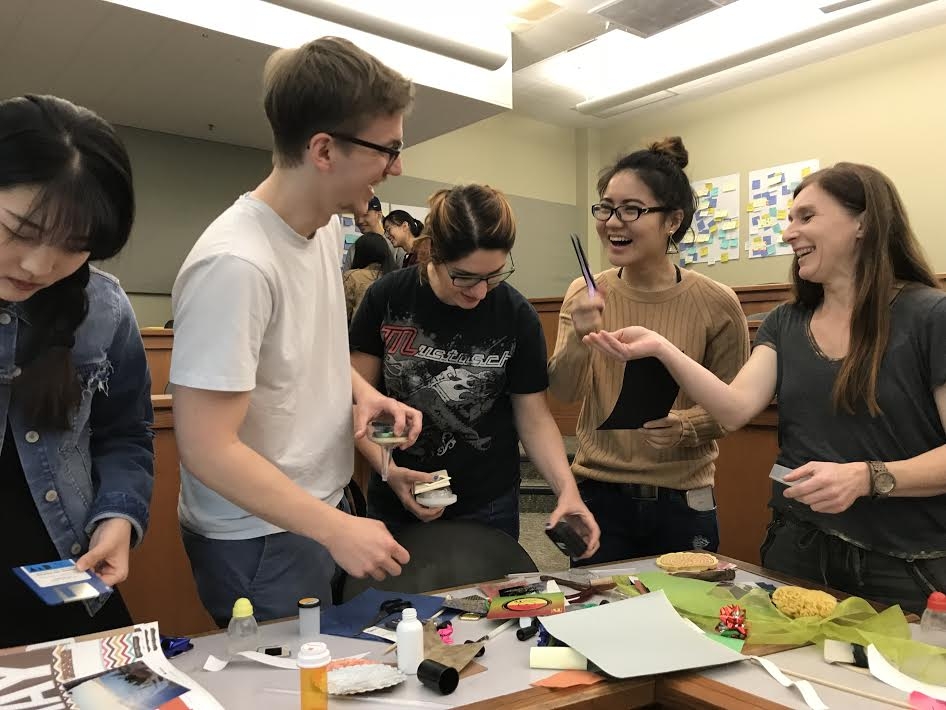
What do you think is the most surprising for international students new to the U.S., specifically the San Francisco Bay Area?
In the Workplace
Developing your personal “story” is critical to effectively communicating who you are and what you can do. You can’t expect to have just a specific set of skills and automatically be hirable or successful here. The exception may be highly technically trained professionals. Rather, it matters who you are as a person, why you are seeking a specific position, and how you communicate and connect with those who are involved in the hiring process.
Further, the culture of business in this area is unique. Frequently, failure is expected and encouraged as long as it’s followed by insightful recovery and progress. Creativity can sometimes be more important than initial skill if you demonstrate resilience and continuous learning. Therefore, employers expect you to both embody this in your work, and to be literate in explaining what you’ve learned and how this informs your work going forward.
In the Classroom
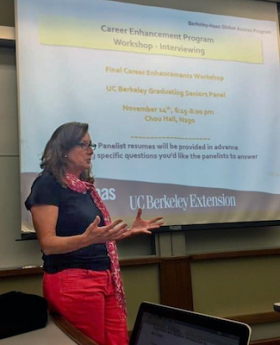
What may be surprising for some international students is the expectation that you actively participate in class. Depending on a student’s country of origin, he or she may not be accustomed to providing an opinion in class, or sharing impromptu ideas and thoughts throughout a group discussion.
However, these actions are critical, and in my class we discuss them explicitly, because I’m teaching about processes: how to identify what you want and what your strengths are, how this shapes your career choices, how to organize your activities around specific goals. The content actually comes from the students, so it’s highly dependent upon participation.
If you were to talk to a prospective international student considering BHGAP, what would you tell them? What do you think makes the program experience unique?
Every interaction I have with BHGAP students provides a chance for her or him to think about things differently. Our conversations trigger questions that get them closer to the career path they desire at a critical time in their academic journey.
The location of this program is also huge. The Silicon Valley company visits mean students are face-to-face with the innovation and creativity that is happening here. They get to see what it’s really like to work in the industry.
I’d encourage students to attend BHGAP for the full academic year and take part in a BHGAP internship to get the most out of their experience, as opposed to just studying for one semester. It’s an investment, but worthwhile: the academics of this program and this university are on par with other top universities, public or private.
This is a global program and it’s accelerated—in just one or two semesters, you learn at one of the best business schools in the world and develop skills that translate to success anywhere in the world.
Learn More
Find out more about the Berkeley Haas Global Access Program experience and how to get involved.
